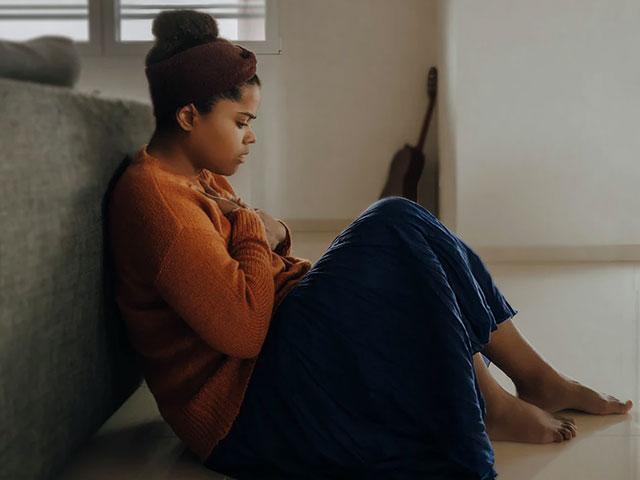
Many cancer patients experience often-overlooked emotional trauma from the moment they are diagnosed with the disease until long after their doctor declares they have recovered.
About 17 million Americans living today have beaten cancer. That’s the highest level of survival of the dreaded disease in history. Oncologists and other cancer specialists focus on ridding the body of the disease, but rarely delve into the emotional aspects of what it means to hear the devastating diagnosis, endure cancer treatment, and live with its after-effects.
Cancer PTSD
One of those after-effects is the fear that the disease might be back whenever a cancer survivor experiences the slightest ache or pain. Others include anxiety and depression which are common emotions among patients who have been given a clean bill of health. Unfortunately, these emotions are rarely addressed. Some call it “cancer PTSD.”
Traumatic emotions associated with cancer often begin with the initial impact from the original devastation a patient feels upon hearing the words, “You have cancer,” according to Cynthia Hayes, a cancer survivor who knows first-hand about the wide variety of emotions associated with the various phases of cancer.
“For most of us, we don’t have any signs or symptoms,” she told CBN News, “And that diagnosis comes out of the blue and sends us into instant shock and fear and panic and disbelief.”
A successful marketing executive, Cynthia thought she was healthy. Then a routine pap test revealed an aggressive gynecological cancer.
“I needed a radical hysterectomy and then six months of chemotherapy. It was a very disorienting experience,” she said.
Fortunately, her treatment worked, and doctors told her the cancer was gone. For Cynthia, however, the emotions associated with the diagnosis remained.
“We go back to being fearful because, again, our bodies betrayed us,” she explained. “We can’t trust that we’re going to know if the cancer is back.”
A Common Experience
After doing her own research involving hundreds of cancer survivors as well as oncologists and mental health professionals, Cynthia discovered she wasn’t alone.
“I was surprised at the degree to which cancer was an emotional diagnosis as well as a physical one,” she said.
That revelation led to her best-selling book, The Big Ordeal: Understanding and Managing the Psychological Turmoil of Cancer.
“We’re all struggling with loss and a sense of identity that we need to recapture as we are coming out of the experience.”
A Healthy Diet Helps
To do that, your body needs help. Cynthia’s research led her to discover that an anti-inflammatory diet helps heal the emotions. That involves eating a diet rich in a variety of vegetables and fruits. Another key to an anti-inflammatory diet involves consuming healthy fats such as avocadoes, olive oil, and nuts.
Aim for so-called “clean” protein, such as wild-caught fish, as well as beef and poultry that have been raised without chemical feeds.
Additionally, try to avoid food and drinks that can cause inflammation such as sugary sodas and other sweet treats.
Unfortunately, most processed foods lead to harmful inflammation in the body. That’s because most packaged foods and fast foods are made with harmful oils and sweeteners. There are over 100 different types of sugar added to processed foods.
Reduce Stress
Cynthia’s research also led her to understand the importance of stress reduction when trying to deal with the negative emotions associated with cancer.
Exercise is an excellent stress reliever. Check with your doctor about what type of exercise is right for you during and after treatment. Sometimes if helps to gradually resume an exercise routine that fits your lifestyle. Make sure not to overdo it at first which can lead to injury or can sometimes sabotage your desire to continue exercising. A brisk daily walk is often all a person needs to notice the positive mental effects of exercise.
Another red flag when it comes to stress is jumping back into work too quickly or too aggressively. Most cancer patients should ease back into stressful responsibilities. That sometimes requires discipline.
“It’s so easy to think, ‘Well ok, now I’ve got to make up for, I was out of the office for six months,’ or ‘I wasn’t pulling my weight around home for a period of time. I’ve got to make up for it,'” Cynthia said.
Get Some Type of Therapy
Talking through your emotions can also help.
“Most hospitals and cancer centers have psycho-social support, or supportive care or palliative care,” Cynthia explained. “And all of those resources are there for you if you ask for them.”
Cancer patients can also find a variety of online support groups. A growing number of churches provide cancer ministries, too. Discussing emotions dealing with cancer has shown to help participants not only heal from painful feelings, but Cynthia described many people who actually grow into a stronger person, both emotionally and spiritually, than they were before their cancer diagnosis.
She explained many people have realizations such as, “‘I’m going to quit my job, I’m going to go back to the church, I’m going to do whatever it is that I haven’t done because I’ve been so focused on other things but now the cancer has taught me what’s important to me.'”
While no one wants a cancer diagnosis, a number of cancer survivors say facing death put their life in proper perspective and became the best thing that ever happened to them.
The remainder of this article is available in its entirety at CBN